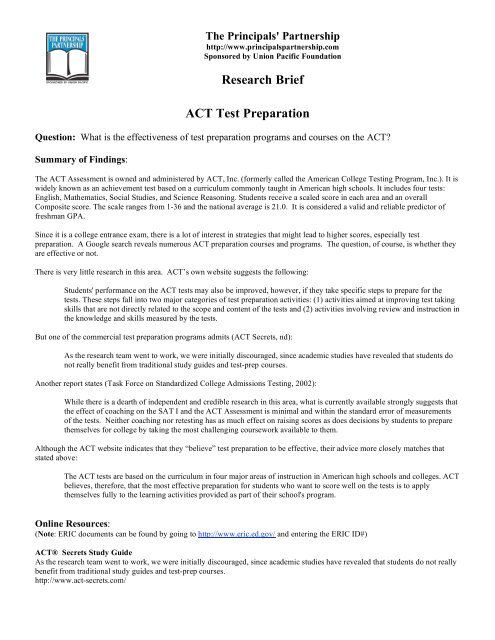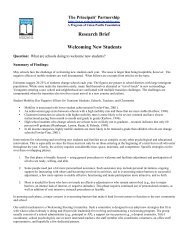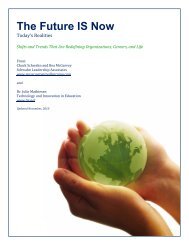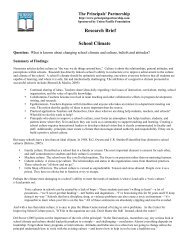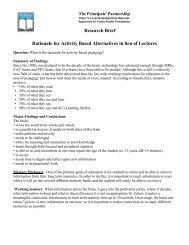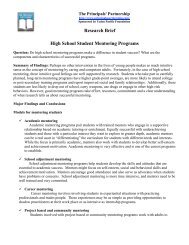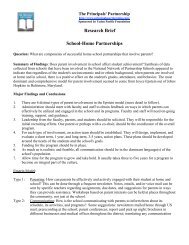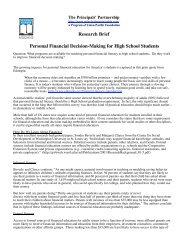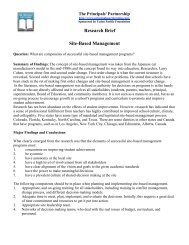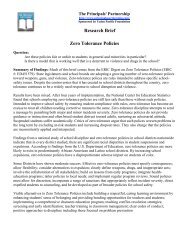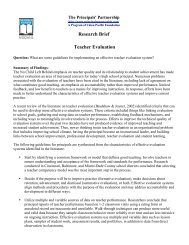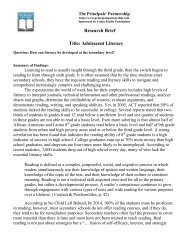Research Brief ACT Test Preparation - Online Effectiveness ...
Research Brief ACT Test Preparation - Online Effectiveness ...
Research Brief ACT Test Preparation - Online Effectiveness ...
Create successful ePaper yourself
Turn your PDF publications into a flip-book with our unique Google optimized e-Paper software.
The Principals' Partnership<br />
http://www.principalspartnership.com<br />
Sponsored by Union Pacific Foundation<br />
<strong>Research</strong> <strong>Brief</strong><br />
<strong>ACT</strong> <strong>Test</strong> <strong>Preparation</strong><br />
Question: What is the effectiveness of test preparation programs and courses on the <strong>ACT</strong><br />
Summary of Findings:<br />
The <strong>ACT</strong> Assessment is owned and administered by <strong>ACT</strong>, Inc. (formerly called the American College <strong>Test</strong>ing Program, Inc.). It is<br />
widely known as an achievement test based on a curriculum commonly taught in American high schools. It includes four tests:<br />
English, Mathematics, Social Studies, and Science Reasoning. Students receive a scaled score in each area and an overall<br />
Composite score. The scale ranges from 1-36 and the national average is 21.0. It is considered a valid and reliable predictor of<br />
freshman GPA.<br />
Since it is a college entrance exam, there is a lot of interest in strategies that might lead to higher scores, especially test<br />
preparation. A Google search reveals numerous <strong>ACT</strong> preparation courses and programs. The question, of course, is whether they<br />
are effective or not.<br />
There is very little research in this area. <strong>ACT</strong>’s own website suggests the following:<br />
Students' performance on the <strong>ACT</strong> tests may also be improved, however, if they take specific steps to prepare for the<br />
tests. These steps fall into two major categories of test preparation activities: (1) activities aimed at improving test taking<br />
skills that are not directly related to the scope and content of the tests and (2) activities involving review and instruction in<br />
the knowledge and skills measured by the tests.<br />
But one of the commercial test preparation programs admits (<strong>ACT</strong> Secrets, nd):<br />
As the research team went to work, we were initially discouraged, since academic studies have revealed that students do<br />
not really benefit from traditional study guides and test-prep courses.<br />
Another report states (Task Force on Standardized College Admissions <strong>Test</strong>ing, 2002):<br />
While there is a dearth of independent and credible research in this area, what is currently available strongly suggests that<br />
the effect of coaching on the SAT I and the <strong>ACT</strong> Assessment is minimal and within the standard error of measurements<br />
of the tests. Neither coaching nor retesting has as much effect on raising scores as does decisions by students to prepare<br />
themselves for college by taking the most challenging coursework available to them.<br />
Although the <strong>ACT</strong> website indicates that they “believe” test preparation to be effective, their advice more closely matches that<br />
stated above:<br />
The <strong>ACT</strong> tests are based on the curriculum in four major areas of instruction in American high schools and colleges. <strong>ACT</strong><br />
believes, therefore, that the most effective preparation for students who want to score well on the tests is to apply<br />
themselves fully to the learning activities provided as part of their school's program.<br />
<strong>Online</strong> Resources:<br />
(Note: ERIC documents can be found by going to http://www.eric.ed.gov/ and entering the ERIC ID#)<br />
<strong>ACT</strong>® Secrets Study Guide<br />
As the research team went to work, we were initially discouraged, since academic studies have revealed that students do not really<br />
benefit from traditional study guides and test-prep courses.<br />
http://www.act-secrets.com/
The Principals' Partnership<br />
http://www.principalspartnership.com<br />
Sponsored by Union Pacific Foundation<br />
<strong>Research</strong> <strong>Brief</strong><br />
A Review Of The Use Of Standardized <strong>Test</strong> Scores In The Undergraduate Admissions Process At The University Of Texas<br />
At Austin<br />
By Task Force on Standardized College Admissions <strong>Test</strong>ing<br />
January 25, 2002<br />
While there is a dearth of independent and credible research in this area, what is currently available strongly suggests that the<br />
effect of coaching on the SAT I and the <strong>ACT</strong> Assessment is minimal and within the standard error of measurements of the tests.<br />
Neither coaching nor retesting has as much effect on raising scores as does decisions by students to prepare themselves for college<br />
by taking the most challenging coursework available to them. The use of the <strong>ACT</strong> Assessment and the SAT I: Reasoning <strong>Test</strong><br />
increases the confidence, reliability and accuracy of attempts to predict freshman GPA.<br />
http://www.utexas.edu/student/admissions/research/taskforce.html<br />
<strong>ACT</strong> <strong>Test</strong> <strong>Preparation</strong> Solutions<br />
<strong>ACT</strong> firmly believes that the most important prerequisite for optimum performance by students on the <strong>ACT</strong> tests is a sound,<br />
comprehensive educational program. Regardless of GPA level, gender, ethnicity, or family income, those students who elect to<br />
take four or more years of English and three or more years of course work in mathematics, science, and social studies earn higher<br />
<strong>ACT</strong> scores. <strong>ACT</strong> believes, however, that selected test preparation efforts, can be beneficial to students. <strong>ACT</strong> considers such<br />
efforts as supplements to, rather than substitutes for, sound academic preparation.<br />
http://www.act.org/path/secondary/solution.html<br />
Prepared Remarks For The Secretary Of Education’s Commission On The Future Of Higher Education<br />
Submitted By Michael Dannenberg, Director, Education Policy Program, New America Foundation<br />
February 24, 2006<br />
Commercial test-preparation courses raise student scores an average of over 100 points, but charge students up to $1,000 each and<br />
are thus disproportionately utilized by upper-income students.<br />
http://www.newamerica.net/Download_Docs/pdfs/Doc_File_2913_1.pdf<br />
The Effects of Coaching on the <strong>ACT</strong> Scores of African-American Students.<br />
Moss, Gary<br />
Interest in the effectiveness of test coaching has prompted many studies, almost all of which have been directed toward coaching's<br />
effect on results of the Scholastic Assessment <strong>Test</strong> (SAT). The focus of this research was to investigate whether preparation for the<br />
American College <strong>Test</strong> (<strong>ACT</strong>) provided by professional coaches would raise the scores of African-American students. Subjects<br />
were 19 African-American high school students working as summer law interns (a special summer program conducted by St.<br />
Louis, Missouri Public Schools) who participated in pretest and posttest. Instruction was provided by professional coaches from<br />
the "Focus on Learning" tutoring company in a 6-week program on Saturdays. The average increase among these students was<br />
1.34 points. Consideration of other variables made it apparent that the majority of the increase could be attributed to the coaching<br />
they received. Although the increase was modest, it might have made a difference in obtaining admission for the students who<br />
derived the most benefit. The study shows that, with proper intervention, the <strong>ACT</strong> scores of African-American students can be<br />
increased.<br />
ERIC #: ED399265<br />
Submitted Date: 9/5/2006 By: Mike Muir, Maine Center for Meaningful Engaged Learning<br />
http://www.principalspartnership.com<br />
This is provided as a service to educators by The Principals Partnership and Union Pacific Foundation, neither of which assumes any responsibility for the content<br />
of the brief or the positions taken by the authors or the Web sites or other authors whose works are included. This research brief reflects information currently<br />
available and is not the official position of The Principals Partnership or Union Pacific Foundation.<br />
Disclaimer: All URLs listed in this site have been tested for accuracy, and contents of Web sites examined for quality, at the time of addition. Content accuracy and<br />
appropriateness, however, cannot be guaranteed over time as Web sites and their contents change constantly. The author takes no responsibility for difficulties<br />
which may result from the use of any Web site listed herein. Please notify the Webmaster if you find any dead links or inappropriate material.<br />
Permission: You may use or download content for research or educational purposes, or for your personal, noncommercial purposes, provided you keep unchanged<br />
all copyright and other notices with them. No other use of any content is permitted. You agree that you will make only lawful use of this research brief, and will<br />
only use these briefs in compliance with all federal, state and local laws and regulations. You agree that you will make no use of the research that violates anyone<br />
else's rights, including copyright, trademark, trade secret, right of privacy, right of publicity or other rights.


